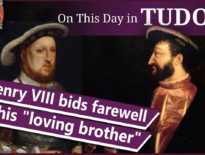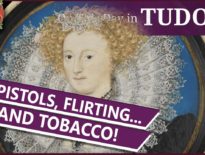On this day in Tudor history, 28th October 1570, Ivan IV of Russia, known commonly as Ivan the Terrible, wrote a rather rude letter to Queen Elizabeth I.
Ivan was upset with Elizabeth's reaction to his idea of a political alliance, an agreement to help each other if their lives were in danger, and wrote the letter while he was still angry. They were words that must have made Elizabeth see red for a while, but she managed to write a calm reply to him.
Find out exactly what Ivan the Terrible and Elizabeth I wrote to each other, and how they came to be corresponding in the first place, in today's talk.
May 10 - A search for the Northeast Passage finds Ivan the Terrible instead:
Also this day in Tudor history, 28th October 1532, the Feast of St Simon and St Jude, was the last full day of Henry VIII and Anne Boleyn’s time with King Francis I of France in Calais, and it was time to celebrate the kings' friendship. New Knights of the Garter were elected, bear-baiting was watched and then there was a wrestling match between French and English men, but who would win? Find out what happened in last year’s video:
Also on this day:
- 1479 – Birth of Sir John Gage, courtier, at Burstow in Surrey. Gage served Henry VIII, Edward VI and Mary I, and his offices included Privy Councillor, Comptroller of Calais, Chancellor of the Duchy of Lancaster, Comptroller of the Household, Constable of the Tower and Lord Chamberlain.
- 1561 – Death of Sir Rowland Hill, merchant and Lord Mayor of London. He was buried in the church of St Stephen Walbrook.
- 1570 – Death of Thomas Causton, composer, in London. It is thought that he was a chorister in Cardinal Wolsey's household and a Gentleman of the Royal Household Chapel from 1550. His works included some metrical psalms which were published by John Day in 1563 in “Whole Psalmes in Foure Partes”, and also in “Certaine Notes”.
- 1571 – Death of William Parr, Marquis of Northampton and brother of Queen Catherine Parr, at Thomas Fisher’s house in Warwick. He had suffered from severe gout. Parr was laid to rest on 5th December in St Mary’s Church, Warwick.
Transcript:
On this day in Tudor history, 28th October 1570, Ivan IV of Russia, known commonly as Ivan the Terrible, wrote a rather rude letter to Queen Elizabeth I.
I’ve shared a short excerpt of this letter before, in a Teasel’s Tudor Trivia video, but thought I’d share it with you again, and a bit more of the letter.
But first let me explain the context of this letter.
If you listened to my talk from 10th May this year, you may remember me mentioning the search for a Northeast Passage to Asia, a new trade route, at the end of Edward VI’s reign. An expedition led by Richard Chancellor and Sir Hugh Willoughby set out in May 1553 but the voyage failed – and I’ll give you a link to my talk on it so you can find out more. However, Richard Chancellor, whose ship had taken refuge in the harbour of the Nikolo-Korelsky Monastery, on the Northern Dvina river, was invited to Czar Ivan IV’s court in Moscow. There, he was able to negotiate a trade agreement between England and Russia through the White Sea.
Fast-forward to Elizabeth I’s reign, and by then there were English ambassadors at Ivan’s court and Russian ambassadors at Elizabeth’s court, and the two rulers corresponded between 1561 and 1583. In 1570, Ivan wanted more than just a trade alliance, he wanted a political alliance, both offensive and defensive. He was paranoid about plots against him and assumed that Elizabeth was in the same position, so he expected a joint treaty where he would be received in England and he'd offer protection to Elizabeth in Russia. However, Elizabeth couldn’t imagine ever needing to flee England to Russia, writing to Ivan that “the mere mention by her of such a possibility would be an offense to the English people; it could not be the desire of "her dear and loving brother" to bring her into danger in her own country.” She had no need for his treaty, although she went on to say that she would receive Ivan and his family in England if he had to flee Russia, but that they would have to provide for themselves.
Ivan was insulted by her words and on 28th October 1570 he wrote a rude and exasperate letter to the English queen, saying:
“we had thought that you had been ruler over your land, and had sought honor to your self and profit to your Country, and therefore we did pretend those weighty affairs between you and us. But now we perceive that there be other men that do rule, and not men, but boors and merchants, the which seek not the wealth and honour of our majesties, but they seek their owne profit of merchandise. And you flower in your maidenly estate like a maid; and whosoever was trusted in our affairs and did deceive us, it were not meet that you should credit them. And now seeing it is so, we do set aside those affairs; and those boorish Merchants that have been the occasion that the pretended wealths and honours of our Majesties hath not come to pass, but do seek their own wealths, they shall see what traffic they shall have here; for our city of Moscow, before their traffic to it, hath not greatly wanted English commodities. And the privilege that we gave to your Merchants, and sent to you, that you would send it us again, and whither it be sent or no, we will give commandment that nothing shall be done by it. And all those privileges which we have given aforetime be from this day of none effect...”
Oh dear! I can imagine steam coming out of Elizabeth’s ears at those words. Here was Ivan belittling her as a woman and suggesting that she wasn’t really a ruler over her kingdom.
While Ivan had written in anger, Elizabeth calmed down before she replied and was able to write calmly “Our ambassador [Jenkinson] will tell you in all truth, that no merchants are governing the estate and our affairs, but we rule ourselves with the honour befitting a virgin queen appointed by God; and no sovereign, thanks to God, has more obedient subjects.”
I bet she wanted to add “so there!”
So there you have it, a rude letter from Ivan the Terrible to Elizabeth I on this day in 1570!



Ivan the Awesome also wanted to marry Elizabeth and instead she put him off by suggesting poor Mary Herbert who had been badly marked by smallpox and sent her portrait to put him off. I am not sure what number wife Elizabeth would have been but Ivan had seven wives, the first four according to Russian Orthodox law were legal, the rest were not. Elizabeth might have been his fourth or fifth. Anyway, it didn’t come to pass and there was another problem. Elizabeth was friendly with the Ottoman Empire, the very enemies Ivan was driving out of his new Empire. I can see were that might have been a problem. However, it wasn’t a total disaster and diplomatic relations were established in which Ivan and Elizabeth actually corresponded for a number of years. She also maintained good trade relations with Turkey.
Ivan the Terrible has a lot in common with Henry Viii domestically. He had several wives who died in various ways but also a very sad reproductive history. For example his second wife lost at least four or five children, dying from the complications of child birth. Her son was laid to rest next to her. He did have one adult heir by Anastasia who lived to adulthood. Unfortunately, although once a Renaissance Prince, Ivan became paranoid and probably mad. He killed his own son in a drunken rage. Ivan had witnessed a terrible childhood as well and his father, Grand Prince Vasili iii died when he was three. His life was in danger for the next twelve years.
Unlike Henry Viii Ivan was a warrior, expanding his empire to take Khazan and to defeat the Tarters. Maria was the daughter of a Tarter Prince with whom Ivan made a pact in order to drive out the Turks. She converted to the Orthodox Faith. Ivan was both ruthless and generous at the same time and had terrible mood swings. He unfortunately is known for several atrocities and punishment of his enemies in horrible ways, but also as a patron of the arts, a promoter of trade and a builder and skilled politician. Some of his alliances were unorthodox. His welcoming of the representatives from England led to a long-term and fruitful trade relationship, although as we have seen his choice words threw it up in the air under Elizabeth I. He did write several more letters to her over several years. Ivan was the first Grand Prince to formally take the title Tsar of all the Russias and to be crowned as such. Despite his reputation he was actually popular with the ordinary people and his legal reforms transformed the nation in every aspect of life. Unfortunately, Serfdom wasn’t changed much under any Tsar until Alexander ii who was assassinated as a result. He also built Saint Basil, a complex of seven beautiful Churches. He was buried in a remote monastery where he found sanctuary and contemplation as repentance for the death of his son. After his death, leaving another very young son as Tsar, everything descended into chaos. The Time of Troubles followed, with several pretenders, several Dmitry characters and after a number of cousins and remote short reigns, a young man of little experience and yet another cousin and nephew was called upon to be the Tsar. His surname would give rise to the Dynasty that ruled from 1613 to 1918. Mikhail Romanov was the first in a new line of Tsars not to die in horrible circumstances and whose Dynasty ended in the murder of the Tsar, his wife and his children. Russia would rise to its greatest triumphs and grow to its furthest expansion under his descendents and fall to its most tragic lows.